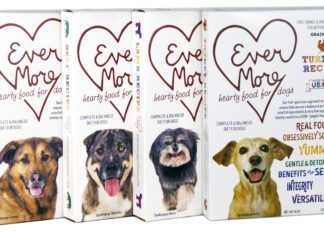Bone broth is a simple soup stock made by cooking bones from beef, pork, lamb, goat, bison, poultry, fish, or other meats in water. Traditionally a convalescent food for humans recovering from illness, it has become a popular treat for dogs. Bone broth is promoted for the improvement of:
- Digestion and nutrient assimilation
- Skin, coat, and nail health
- Immune function
- Joint mobility
- Detoxification support
Bone broth is rich in gelatin, a protein-rich substance that, when heated and cooled, forms a gel-like texture (think Jello). Gelatin added to other foods aids digestion and provides minerals such as calcium, magnesium, phosphorus, and potassium. Because it contains some but not all of the essential amino acids, gelatin is nutritionally incomplete and should not be used as a stand-alone meal substitute.
How much bone broth to feed
The recommended daily amount for dogs is 1 fluid ounce per 10 pounds of body weight, such as 6 fluid ounces (3/4 cup) for a 60-pound dog. Start with smaller amounts to be sure your dog tolerates it well and increase gradually.
Several bone broth products, including dehydrated powders, are sold as canine nutritional supplements or meal toppers. Some are made from the bones of pasture-raised or grass-fed animals, which are considered more nutritious than factory farmed animal bones. Examples include Open Farm Bone Broth for Dogs and Caru Bone Broths for Dogs and Cats. Products made from human-grade ingredients include Honest Kitchen Bone Broth and Solid Gold Bone Broths.
Made-for-dogs bone broths are a safer choice than broths sold for human consumption because they are less salty and don’t contain onions or other ingredients that can be toxic to dogs.
Bone broth recipe
Start with 3 to 4 pounds of raw or leftover bones with meat and connective tissue attached. In a large pot, slow cooker, or Instant Pot add enough filtered water to cover the bones by 2 inches. Add 1 tablespoon cider vinegar or lemon juice. If desired, add 4 cups chopped carrots, celery, pumpkin, green beans, or other dog-friendly vegetables. Let stand for 30 minutes before cooking to enhance the release of minerals.
- Stovetop: Bring to a boil, reduce heat to a bare simmer, cover with the lid slightly ajar, and cook for 24 hours (poultry bones) or 48 hours (beef or red meat bones).
- Slow cooker or crock pot: On low heat setting, cook for 24 hours (poultry) or 48 hours (beef, red meat).
- Oven: Bring ingredients to a boil on the stove, then transfer to a large oven-safe ceramic or metal pot with lid and bake, covered, at 150ºF for 15 to 24 hours
- Instant Pot: Close lid and set to cook on low pressure for 4 hours (poultry) or 5 hours (beef or red meat). Let pressure release naturally.
Strain broth through a fine mesh sieve or muslin fabric and transfer to jars for storage. Discard the layer of fat that collects at the top. Refrigerate for up to 7 days, freeze for up to 3 months.







I have been doing this for years in an instant pot, but I don’t strain. Why should I throw away the bones when they are soft enough to mush with my fingers? And there is yummy bits of meat.
My dogs are fed raw, which means they eat the entire bone, including the marrow. I’m assuming bone broth would be duplicating their regular diet?
Second, I agree with Vicki about not straining the broth. Maybe skim off the fat if preferred but the rest is, as she said, yummy bits of meat. Why waste it by straining?
We are vegetarian, so there’s no leftovers to make broth. What would I purchase from the meat department that includes bones to make this broth with?
Thanks so much for this informative article. I have made my own broth for many years thinking the coating on top of the broth was mainly fat.
I have an overweight, 11year old dog and am wondering if I should give him the gelatin on top. He has arthritis and perhaps the gelatin would do some good.
Many thanks,
Sue
Sue Parks, the meat department for the grocery chain , Publix, here in Florida cuts up beef bones and packages them sale. Maybe your local store does too?